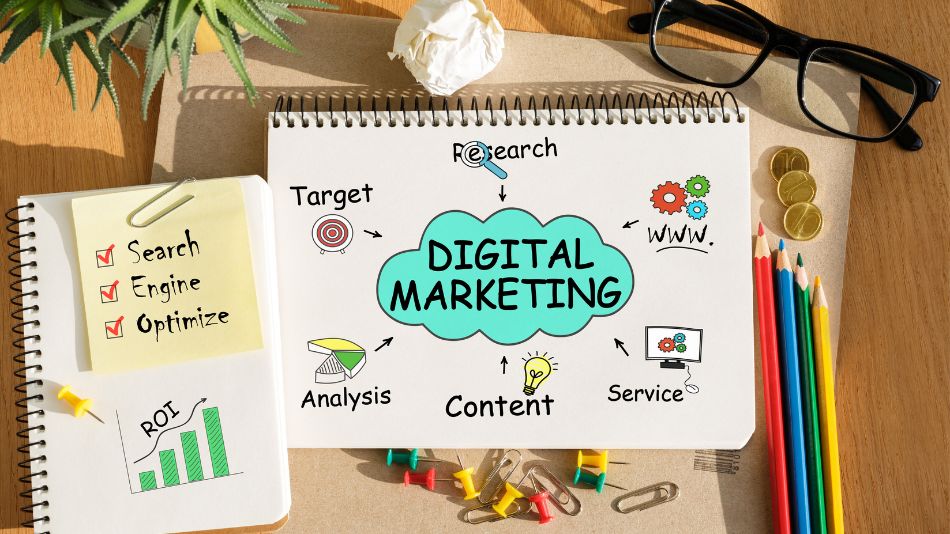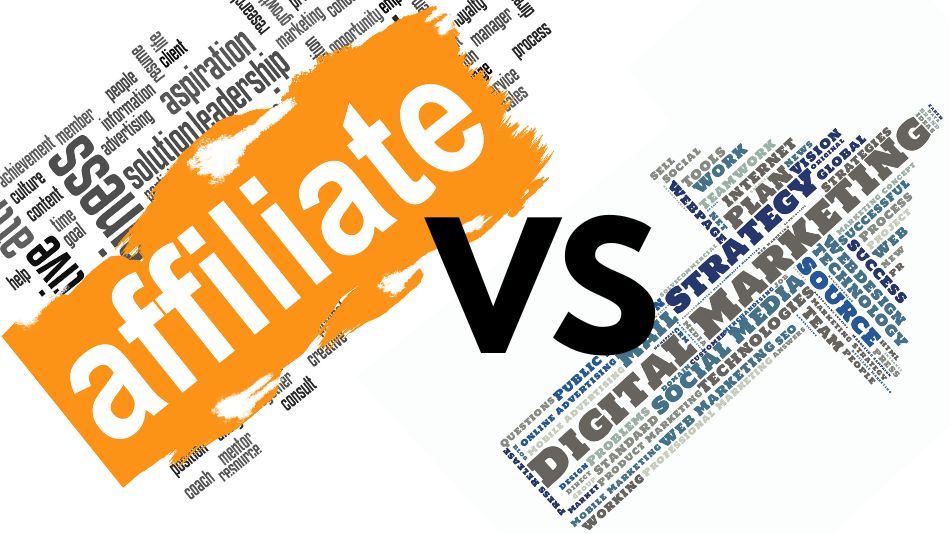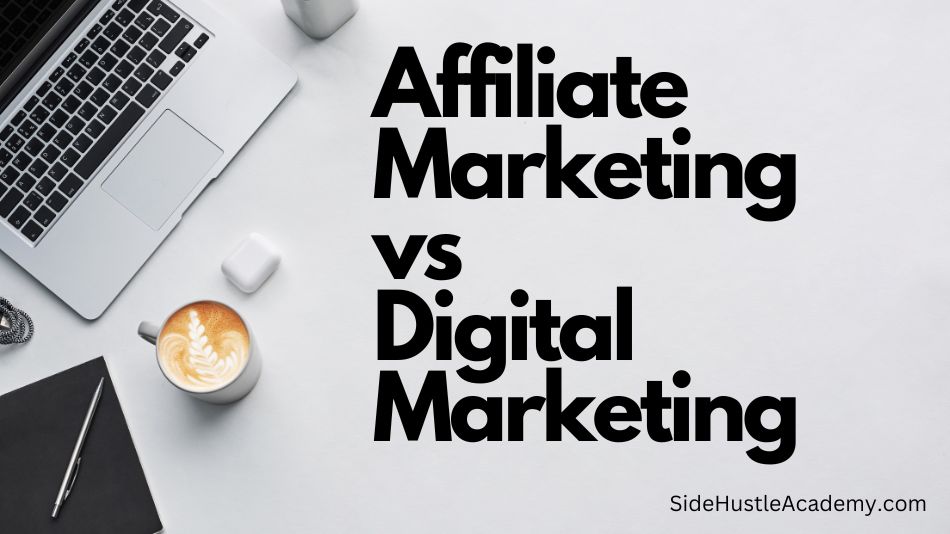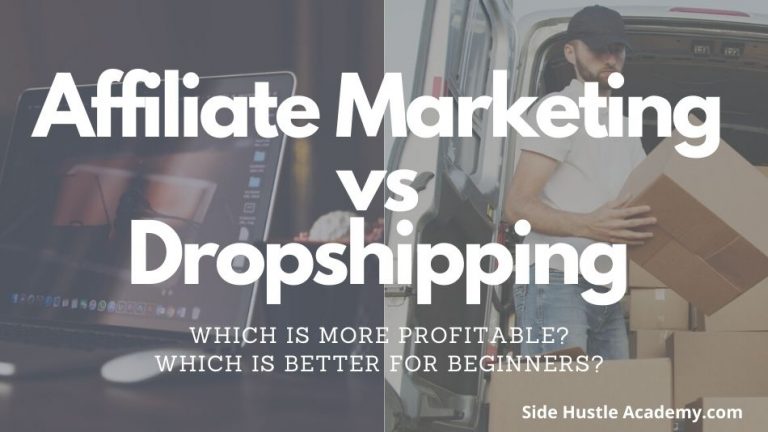Affiliate Marketing vs Digital Marketing: Comparison Chart
As a marketer, you’re likely familiar with “affiliate marketing” and “digital marketing.” Both strategies promote products and services online, but they differ in their approach and execution.
So what is the difference between affiliate marketing vs digital marketing?
Digital marketing is a broad term that encompasses a range of online marketing techniques, including SEO, social media marketing, email marketing, and PPC advertising. The goal of digital marketing is to increase brand awareness, drive traffic to a website, and ultimately convert leads into customers.
Affiliate marketing is a specific type of digital marketing that involves partnering with other businesses or individuals to promote your products or services. In affiliate marketing, the affiliate earns a commission for every sale through their unique referral link.
Key Takeaways
- Digital marketing encompasses a range of online marketing techniques. In contrast, affiliate marketing is a specific type of digital marketing that involves partnering with other businesses or individuals to promote your products or services.
- The goal of digital marketing is to increase brand awareness, drive traffic to a website, and ultimately convert leads into customers. In contrast, affiliate marketing involves commissions for every sale made through a unique referral link.
- Understanding the differences between affiliate marketing and digital marketing is crucial to selecting the right strategy for your brand.
Understanding Digital Marketing

As a digital marketer, I understand that digital marketing refers to all marketing forms that engage with customers via digital channels.
These channels include search engines, social media platforms, email, websites, and mobile apps.
Digital marketing is a broad field that includes various strategies and tools, including SEO, content marketing, social media marketing, email marketing, digital advertising, SEM, Google Ads, analytics, and more.
I’ve been personally doing many of these types of marketing, from content marketing, and SEO, to analytics since 2008 when I started my first blog. This helped me build out my side business, earning over $40,000 a year.
So what do each of these types of digital marketing involve
Search Engine Optimization (SEO)
It optimizes your website and its content to rank higher in search engine results pages (SERPs). This is done by making your website more visible and relevant to search engines and users.
Content marketing involves creating and sharing valuable and relevant content to attract and retain a target audience. This can include blog posts, videos, infographics, and more.
Technical assistance can take your content marketing strategy to the sun (meaning, of course, make high-quality content), and any website works great. If you wish to rank at the top, ensure your Technical SEO of the mark involves aspects like page speed and mobile-friendliness among others.
This solution makes for a great online presence with an exceptional experience for your users and on the other hand, it also ensures that search engines give importance to your website. All of these techniques combined can significantly grow your audience and reach the market you serve so well.
Social Media Marketing
It involves promoting your brand and products on social media platforms like Facebook, Twitter, Instagram, and LinkedIn.
This can include paid advertising, influencer marketing, and organic social media posts. Email marketing involves sending promotional emails to a list of subscribers to promote your products and services.
Digital Advertising
It involves using digital channels to promote your products and services to a targeted audience.
This can include display ads, search ads, video ads, and more. SEM (Search Engine Marketing) is a form of digital advertising involving paid search ads to drive traffic to your website.
Google Ads
It is a popular digital advertising platform that allows you to create and display ads on Google’s search engine results pages (SERPs), as well as on other websites and mobile apps.
Analytics involves tracking and analyzing data to measure the effectiveness of your digital marketing campaigns and strategies.
Exploring Affiliate Marketing

As an affiliate marketer, I earn commissions by promoting other people’s products or services.
This is the essence of affiliate marketing, where I act as an intermediary between the buyer and the seller. When a customer clicks on my affiliate link and makes a purchase, I earn a commission.
There are different types of affiliate marketing, including unattached affiliate marketing, related affiliate marketing, and involved affiliate marketing.
- Unattached affiliate marketing involves promoting products or services without having any direct connection to the seller.
- Related affiliate marketing involves promoting products or services related to my niche or industry.
- Involved affiliate marketing involves promoting products or services that I have personally used or tested.
Affiliate marketing offers a great opportunity to make money online without creating your own products or services.
Affiliate marketing requires a lot of effort and dedication to succeed. It is crucial to choose the right affiliate programs and products to promote, as well as to build a strong relationship with your audience.
How Does Affiliate Marketing Work
To become an affiliate marketer, I must sign up for affiliate programs and obtain my unique affiliate link.
This link contains a special code that tracks my referrals and ensures that I receive credit for any purchases made through my link.
Many affiliate networks offer a wide range of affiliate programs, making it easy to find products or services to promote.
Here is a basic list of some popular affiliate programs.
- Amazon Associates – Pays out between 1 to 20% of anything sold on Amazon, depending on the category.
- eBay – Pays out between 1 to 4% of anything sold on eBay, depending on the category.
- Bluehost – Earn $65 sale.
- Thinkific – Earn 30% recurring income.
- Shopify – Earn between $25 to $150 per sale
However, you can also join affiliate networks that will give you access to various affiliate programs. Here are a few of the most popular ones.
Differences Between Affiliate and Digital Marketing

As an affiliate marketer, I have come across digital marketing and have noticed some key differences between the two. Here are some of the differences:
1. Ownership
In digital marketing, the product owner or retailer promotes products and services directly to customers via digital channels.
On the other hand, affiliate marketing involves promoting other people’s products and services for a commission.
2. Income
In digital marketing, the seller or product owner earns revenue directly from the sales of their products or services.
In affiliate marketing, the affiliate marketer earns a commission from selling the products or services they promote.
3. Time
In digital marketing, the seller or product owner has to spend time and resources promoting their products or services to customers.
In affiliate marketing, the affiliate marketer can spend their time promoting multiple products and services from different merchants.
4. Expertise
In digital marketing, the seller or product owner needs expertise in various digital marketing skills such as SEO, content marketing, social media marketing, email marketing, PPC, and more.
In affiliate marketing, the affiliate marketer can choose to promote products and services in a niche they are familiar with or interested in.
5. Brand Awareness
In digital marketing, the seller or product owner can build brand awareness for their products or services.
In affiliate marketing, the affiliate marketer can build brand awareness as an expert in their niche.
6. Commission
In digital marketing, the seller or product owner earns the full revenue from the sales of their products or services.
In affiliate marketing, the affiliate marketer earns a commission from the sales of the products or services they promote, which may be a percentage of the revenue or a fixed amount.
7. Marketing Strategies
In digital marketing, the seller or product owner can use various marketing strategies such as SEO, PPC, social media marketing, email marketing, and more to promote their products or services.
In affiliate marketing, the affiliate marketer can use SEO, SEM, social media marketing, email marketing, and more to promote the products and services they are affiliated with.
Similarities Between Affiliate and Digital Marketing
As I explore the differences between affiliate marketing and digital marketing, it’s worth noting that there are also some similarities between the two.
Here are a few key areas where affiliate and digital marketing share common ground:
1. Marketing Strategies
Both affiliate and digital marketing rely on effective marketing strategies to reach a target audience.
Whether through email campaigns, social media platforms, or pay-per-click (PPC) advertising, both types of marketing aim to drive sales and revenue through targeted marketing efforts.
2. Audience and Target Audience
Understanding your audience and target audience is crucial to success in both affiliate and digital marketing.
Both types of marketing require a deep understanding of your customers and leads, as well as the ability to tailor your marketing efforts to appeal to their specific needs and interests.
3. Brand Awareness
Both affiliate and digital marketing can be used to build brand awareness and establish a strong online presence.
By creating high-quality content, leveraging social media platforms, and partnering with influencers and other online networks, both types of marketing can help businesses establish themselves as leaders in their niche.
4. Analytics and Tracking Results
Both affiliate and digital marketing rely heavily on analytics and tracking results to measure the success of marketing efforts.
By using tools like Google Analytics, businesses can track website traffic, click-through rates, and other key metrics to determine the effectiveness of their marketing strategies and make data-driven decisions.
Affiliate vs Digital Marketing – A Comparison
As an affiliate marketer, I have found significant differences between affiliate marketing and digital marketing. While both are important for online businesses, each has unique advantages and disadvantages.
| Affiliate Marketing | Digital Marketing | |
| Ownership | In Partnership With the Affiliate Program, They Promote | Promoting Your Content Through Various Marketing Channels |
| Income | Promotes Other People’s Products. They are knowledgeable In | Promotes Other People Brands |
| Time | Takes Time to Promote Affiliate Links to Audience | Commissions Earned From Other People’s Products |
| Expertise | Promotes Other People’s Products. They are knowledgeable In | Must Know a Variety of Things From Content Marketing, SEO, PPC, Email, and Social Media |
| Brand Awareness | Promotes Their Brand | Promotes Other Peoples’s Products. They are knowledgeable In |
| Analytics & Tracking | Uses Tracking Provided By Affiliate Partner | Uses Their Own Tracking Analytics |
Affiliate Marketing vs Digital Marketing – Key Differences
In summary, affiliate marketing primarily focuses on promoting other people’s products and services, while digital marketing focuses on promoting a company’s products and services.
Affiliate marketing can be a great way to generate passive income, while digital marketing requires constant effort to generate leads and convert them into customers.
Affiliate marketers can benefit from the brand awareness generated by the product owner or retailer. In contrast, digital marketers can benefit from various online platforms and tools to promote their products and services.
Frequently Asked Questions
What are the differences between affiliate marketing and digital marketing?
Affiliate marketing and digital marketing are both online marketing strategies that have different approaches to generating revenue. Affiliate marketing is a performance-based marketing strategy where affiliates promote a product or service and earn a commission for each sale made through their unique affiliate link. On the other hand, digital marketing is a broad term that encompasses all types of online marketing strategies, including social media marketing, email marketing, search engine optimization (SEO), and pay-per-click (PPC) advertising.
What are the advantages of affiliate marketing over digital marketing?
One of the main advantages of affiliate marketing over digital marketing is that it requires less investment upfront. Affiliates do not have to create their products or services, and they do not have to spend money on advertising or marketing campaigns. Additionally, affiliates can earn passive income by promoting products or services that are already popular and have a proven track record of success.
How do affiliate marketing and digital marketing differ in terms of revenue generation?
Affiliate marketing and digital marketing differ in terms of revenue generation because affiliate marketing is a commission-based model. In contrast, digital marketing can generate revenue through various channels. In affiliate marketing, affiliates earn a commission for each sale made through their unique affiliate link, while digital marketing can generate revenue through advertising, lead generation, and other channels.
What are the benefits of an affiliate marketing course versus a digital marketing course?
Taking an affiliate marketing course can provide individuals with a comprehensive understanding of how to promote products or services through affiliate marketing strategies. These courses can provide in-depth knowledge of how to choose the right products or services to promote, how to create effective marketing campaigns, and how to build a successful affiliate marketing business. On the other hand, digital marketing courses cover a wide range of topics, including social media marketing, email marketing, SEO, and PPC advertising.
What are the top affiliate marketing programs to join?
The top affiliate marketing programs to join depend on the niche and industry the individual is interested in promoting. Some of the most popular affiliate marketing programs include Amazon Associates, ClickBank, and Commission Junction. However, it is important to research different programs and choose the one that best fits the individual’s interests and goals.
Is affiliate marketing a sustainable career choice compared to digital marketing?
Affiliate marketing can be a sustainable career choice compared to digital marketing because it requires less investment upfront and can generate passive income over time. However, it is important to note that building a successful affiliate marketing business takes time and effort, and it is not a get-rich-quick scheme. Digital marketing, on the other hand, can provide a broader range of career opportunities and can be a more stable career choice in the long run.







